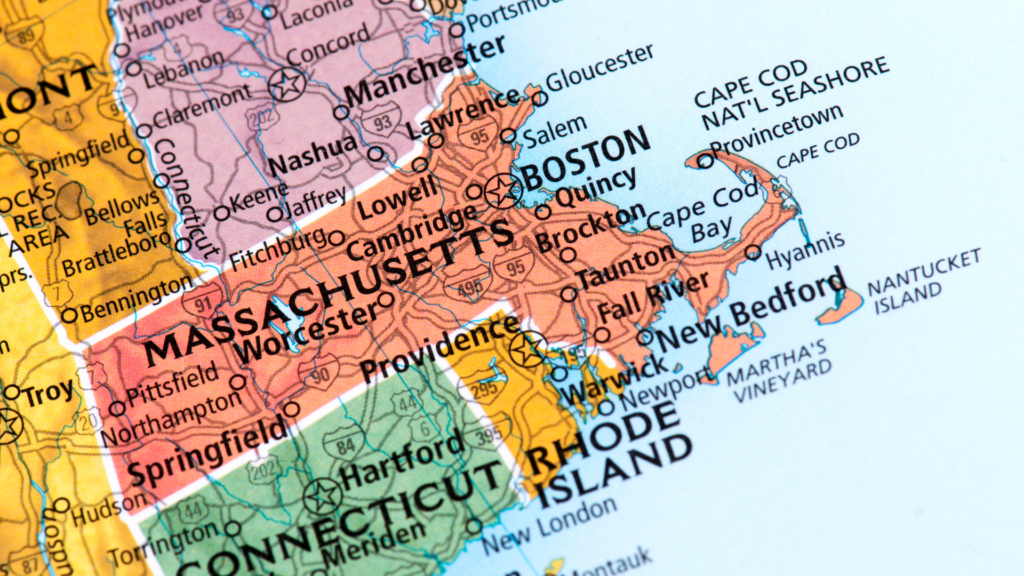
Table of Contents
Data Centers in Massachusetts: Six Reasons to Colocate in the Bay State
With over 7 million residents, Massachusetts has a thriving economy and business environment. Boston is one of America’s economic hubs, with the 8th largest GDP of any US metro area. Data centers in Massachusetts can serve a wide range of customers because of the state’s reliable network infrastructure, strategic location, and clean power supply.
The Bay State is home to 41 data center locations, making it easy for local and international customers to select a colocation facility that matches their unique requirements. This article will explore six reasons you should consider a Boston data center.
Massachusetts Has a Thriving Data Center Industry
There are 41 data centers in the state, with the largest concentration of providers in the Metro Boston area. These data center providers support many local and international businesses that require colocation services. Boston colocation providers include:
- Markley Data Center (1 Summer Street, 02110 Boston)
- Cyxtera Waltham Data Center (600 Winter Street, Waltham)
- EdgeConnex Boston Data Center (22 Linnell Circle, 01821 Billerica)
- Cogent Boston Data Center (59 Inner Belt Road, 02143 Somerville)
- Lumen Cambridge Boston Data Center (300 Bent Street, 02141 Cambridge)
- Evocative’s Boston Data Center (50 Inner Belt Road, 02143 Somerville) – Formerly INAP’s Boston data center before the colocation facility was acquired by Evocative in 2022
Boston’s colocation industry also has up to 800,000 square feet of commissioned space with over 88 megawatts of tenant-commissioned power. Much of this is conveniently located close to downtown Boston. Because the region has numerous data center providers, customers can always find a data center and carrier access that meets their needs and budget.
The State Offers Excellent Network Connectivity
Two major cloud providers with availability zones operate in Massachusetts: Amazon Web Services (AWS) and Google Cloud. Massachusetts’ data centers can connect directly to these cloud providers and access low-latency network connectivity and support. The area also offers a number of cloud on-ramps that allow direct access to cloud servers.
Customers who colocate in the region can also partner with other network service providers. Some popular network providers include North Atlantic Networks, HughesNet, Viasat Internet, Verizon High-Speed Internet, and Spectrum Business. Boston’s robust network access options provide customers with true network diversity, unlimited bandwidth in Boston’s central business district in downtown Boston, and other parts of Massachusetts.
Additionally, data centers in Massachusetts benefit immensely from the state’s elaborate undersea fiber optic network. For example, the Amitié Submarine Fiber Optic Cable Project runs through the Atlantic Ocean to link the US and Europe. This undersea cable passes through the state’s underground ducts and waterways and delivers low latency connectivity to through multiple redundant fiber networks connecting Europe.
Furthermore, the cable passes through the Exclusive Economic Zone (EEZ), which connects data centers in Massachusetts to other cities like Beverly, Salem, Marblehead, Swampscott, Rockport, Gloucester, Manchester, and Lynn. Colocating in Massachusetts may be the right move to serve customers in these regions.
Massachusetts’ extensive connectivity infrastructure provides increased data transmission speeds and capacity. This ensures uptime and network reliability for your data center.

Massachusetts Has a Thriving Business Environment
One factor that attracts data center providers is the presence of economic incentives. To this end, Massachusetts has several tax breaks that colocation facilities and their customers can leverage.
- Finance Support Initiative: Colocation facilities in the state can access 100% financial support when purchasing data center equipment. The state also provides additional support like improved leasehold and working capital to colocation facilities that qualify.
- Economic Breaks: The state’s economic department provides numerous tax breaks to data centers that support the growth of full-time jobs within the Commonwealth. To qualify, these providers must have a long retention index, numerous private investments in the region, and contribute to the growth of the state’s economy.
- Real Estate Support: Massachusetts runs MassEcon, a non-profit that supports data centers that want to expand or relocate to the state. This program is designed to help colocation facilities transition smoothly into the state’s data center industry. For example, the company provides support with site location, real estate deals, and an overview of the state’s regional assets.
With a population of 617,459, Boston is the largest city in Massachusetts. The city has a bubbling economic environment that drives the growth of data centers in the state. Some of the largest employers in the city include tech companies, healthcare institutions, financial businesses, and universities, all of which have an increasing need for colocation services and support.
As a result of this growing economic demand, colocation facilities flock to the region to support local and international businesses that reside in Boston.
All these initiatives make it possible for customers to access reliable colocation services. This is because data centers in Massachusetts can collaborate directly with the state government for better deals and support.
Massachusetts Is Strategically Positioned
In the north, Massachusetts shares a border with Vermont and New Hampshire. It is also surrounded by the Atlantic Ocean in the east, New York in the west, and Connecticut in the south. Furthermore, Boston, Massachusetts, is less than six hours away from other top-tier colocation markets like New York, New Jersey, and Philadelphia. Because of its geographical location, data centers in the state can serve businesses within these regions.
Despite being surrounded by the Atlantic Ocean, Massachusetts has a very low natural disaster profile for natural disasters that affect other data center markets. Although the state experiences mild earthquakes occasionally, the most significant earthquake incident was recorded in 1775. In addition, the state’s emergency department provides maps and resources that help colo providers protect their business and customers’ interests.

Massachusetts Has a Reliable Power Grid and Supply
The state’s average electricity cost is 31 ¢/kilowatt-hour (kWh), which is 32% higher than the average national rate. Unfortunately, this drives up the cost of colocation services.
The state has three primary utility providers that support its power requirements: Eversource, National Grid, and Unitil. Massachusetts’ power generation system is a part of the Independent System Operator (ISO) New England. The ISO is one of Northern America’s most independent power grids, with over 8,00 miles of transmission lines.
This independent power generation system enables data centers to provide consistent quality service to their customers without fearing being offline. Massachusetts’s power cost is higher, but the state’s government has a mix of alternative power sources that data centers can use to reduce power-related costs. For example, the state contracts a lot of offshore wind power farms to generate electricity from alternative sources.
Furthermore, the state’s government has consistently advocated for developing and using cheap, renewable energy in the region. In 2021, 29% of the state’s electricity was generated from renewable sources, and in 2022, the state had about 3,178 megawatts of installed solar capacity. By implementing the Clean Energy and Climate Plan, the state aims to reach net-zero emissions by 2050.
In addition to this initiative, Massachusetts requires colocation facilities to purchase more renewable energy to support their operations. These initiatives allow colocation facilities and customers access affordable and consistent power supply while meeting their sustainability goals.
Many Top Universities Reside in the State
New England is home to many prestigious universities like Harvard University, Massachusetts Institute of Technology (MIT), and Boston University. These institutions are top-rated for the quality of their computer and engineering degrees and research programs.
For example, MIT ranks as one of the best technology schools in the world, and Harvard University is known to train some of the brightest engineering minds. All in all, Massachusetts educational institutions produce a steady stream of talented individuals. These professionals have the right skill set to support the state’s data center industry and foster collaboration with other data center markets via research.
Brightlio Can Help With Colocation Pricing in Massachusetts
We are committed to helping you find the right colocation partner in Boston, Massachusetts and other markets. Because Brightlio has a network of global data center providers, we can provide customized pricing that aligns with your company’s requirements and budgets.
Moreover, we also provide additional services to help your business build a secure and comprehensive technology infrastructure. Some of our IT services include public cloud solutions, network connectivity, unified communications, SD-WAN, and advisory services.
Get in touch with the team today to get started!
If you enjoyed this guide, please visit our guides to colocation in other states:
- California Data Centers: Brightlio’s Ultimate Guide to Colocation in the Golden State
- Data Centers in Connecticut: Six Reasons to Colocate in the Constitution State
- Data Centers in Florida: Colocation in the Sunshine State
- The Iowa Data Center Market: Colocation In America’s Heartland
- Data Centers in Maryland: Innovation in The Old Line State
- New Jersey Data Centers: Powering the Digital Future of the Garden State
- Data Centers in New York: The Gateway to Colocation in the Empire State
- Data Centers in Oregon: 5 Reasons to Colocate in the Pacific Northwest
- Data Centers in Texas: Colocation in the Lone Star State
- The Ohio Data Center Advantage
- Data Centers in Northern Virginia: Brightlio’s Guide to Colocation in the Mid-Atlantic
Recent Posts
Vancouver Data Centers: Colocation in the Pacific Northwest
Business Broadband Solutions: The Ultimate Guide
Let's start
a new project together



